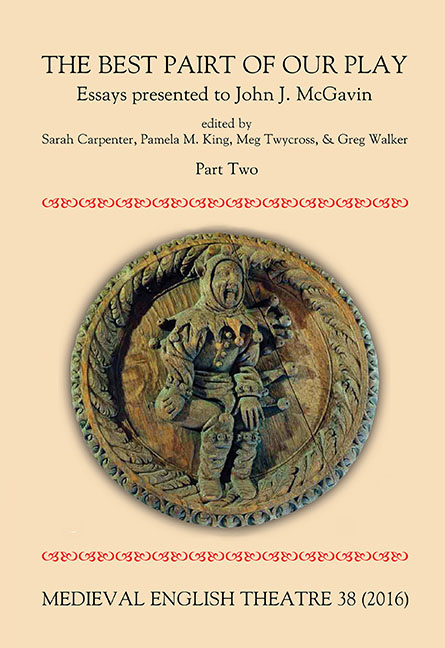 Medieval English Theatre 38
Medieval English Theatre 38 Published online by Cambridge University Press: 20 April 2017
Women's experience in early-modern England has been the subject of increasing scholarly attention in recent times. From a woman's experience of family life and her role in the community, to her political and religious engagement, her alliances, involvement in criminal activity and the courts, and her literary output, scholars have attempted to elucidate all aspects of female life during this significant period in English history in an effort to balance out the vast body of previous work which has focused on male activity and relations. It is widely acknowledged that the bias in earlier scholarship towards early-modern men was largely due to the perceived lack of evidence of women's lives in conventional records; something which reflects the fact that in legal, political, and economic terms early-modern women were not autonomous, being the property of either father or husband and living in a patriarchal society. However, recent work has discovered evidence of female experience in old and new sources alike and, whilst most allow that careful and contextualised reading of this material is necessary, we can now begin to appreciate the truly diverse and complex experiences which formed the lives and identities of early-modern women. One of the most valuable sources of evidence for such experiences is the early-modern libel.
During the early-modern period, libel was considered ‘a growing dangerous and enormious offence’, of which, as one bill of complaint put it, ‘there haue bin manie affrayes of late Committed’. The libels that are the focus of this article are provincial examples from the county of Devon which arose from local disputes, firmly rooted in the conflicts existing in local communities. Due to a series of high profile precedential cases and a change in the law which during the late sixteenth century redefined libel as a criminal rather than a moral offence, libel cases were now being tried at a national level in the court of Star Chamber. Libel and slander cases have received considerable attention from scholars who have viewed them as giving insight into the everyday lives of the people in a way that is difficult to find in other sources of national scope. Whilst the performed nature of provincial libelling has been highlighted by existing scholarship, more attention might profitably be paid to the way in which these libels functioned as performances.
To save this book to your Kindle, first ensure [email protected] is added to your Approved Personal Document E-mail List under your Personal Document Settings on the Manage Your Content and Devices page of your Amazon account. Then enter the ‘name’ part of your Kindle email address below. Find out more about saving to your Kindle.
Note you can select to save to either the @free.kindle.com or @kindle.com variations. ‘@free.kindle.com’ emails are free but can only be saved to your device when it is connected to wi-fi. ‘@kindle.com’ emails can be delivered even when you are not connected to wi-fi, but note that service fees apply.
Find out more about the Kindle Personal Document Service.
To save content items to your account, please confirm that you agree to abide by our usage policies. If this is the first time you use this feature, you will be asked to authorise Cambridge Core to connect with your account. Find out more about saving content to Dropbox.
To save content items to your account, please confirm that you agree to abide by our usage policies. If this is the first time you use this feature, you will be asked to authorise Cambridge Core to connect with your account. Find out more about saving content to Google Drive.